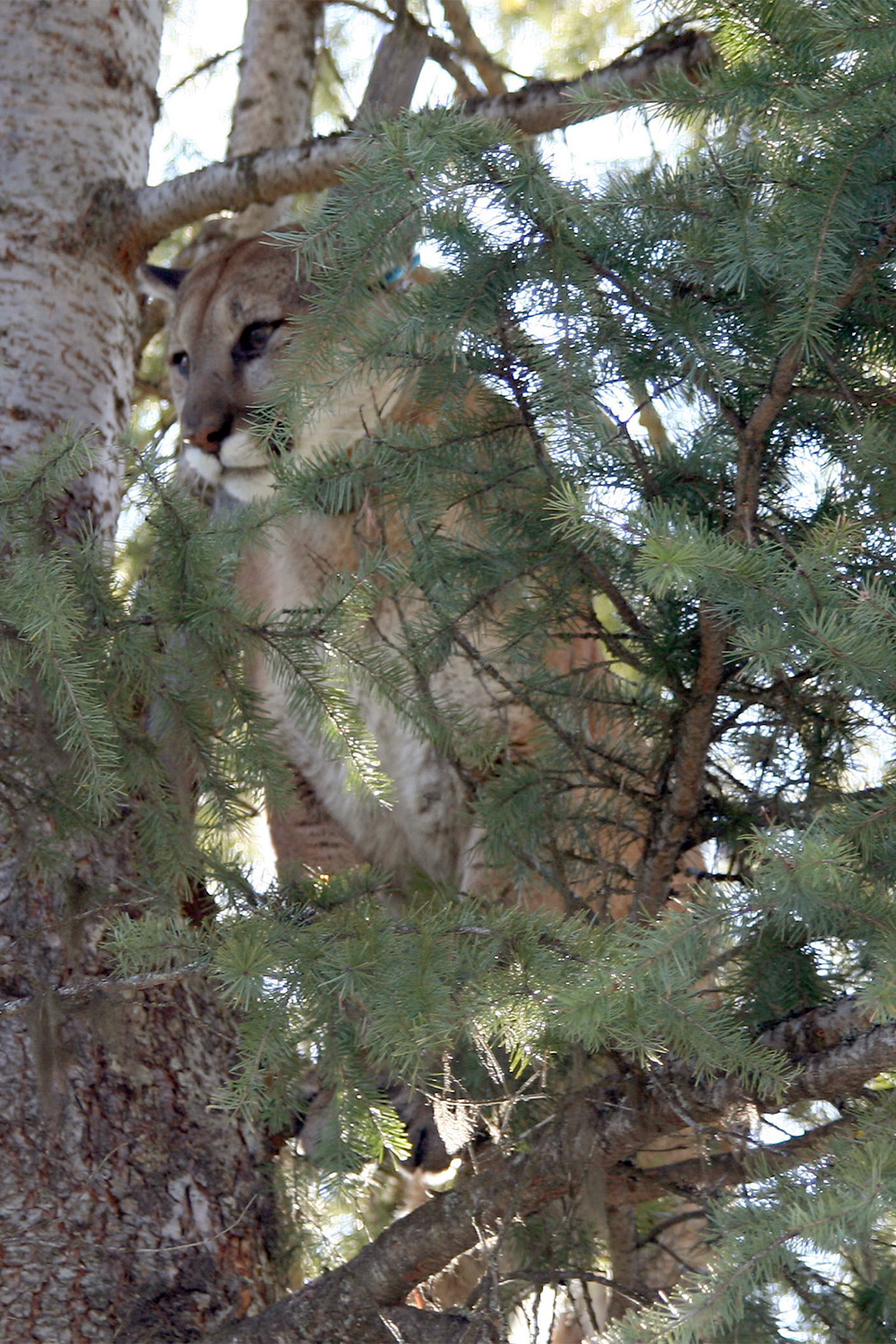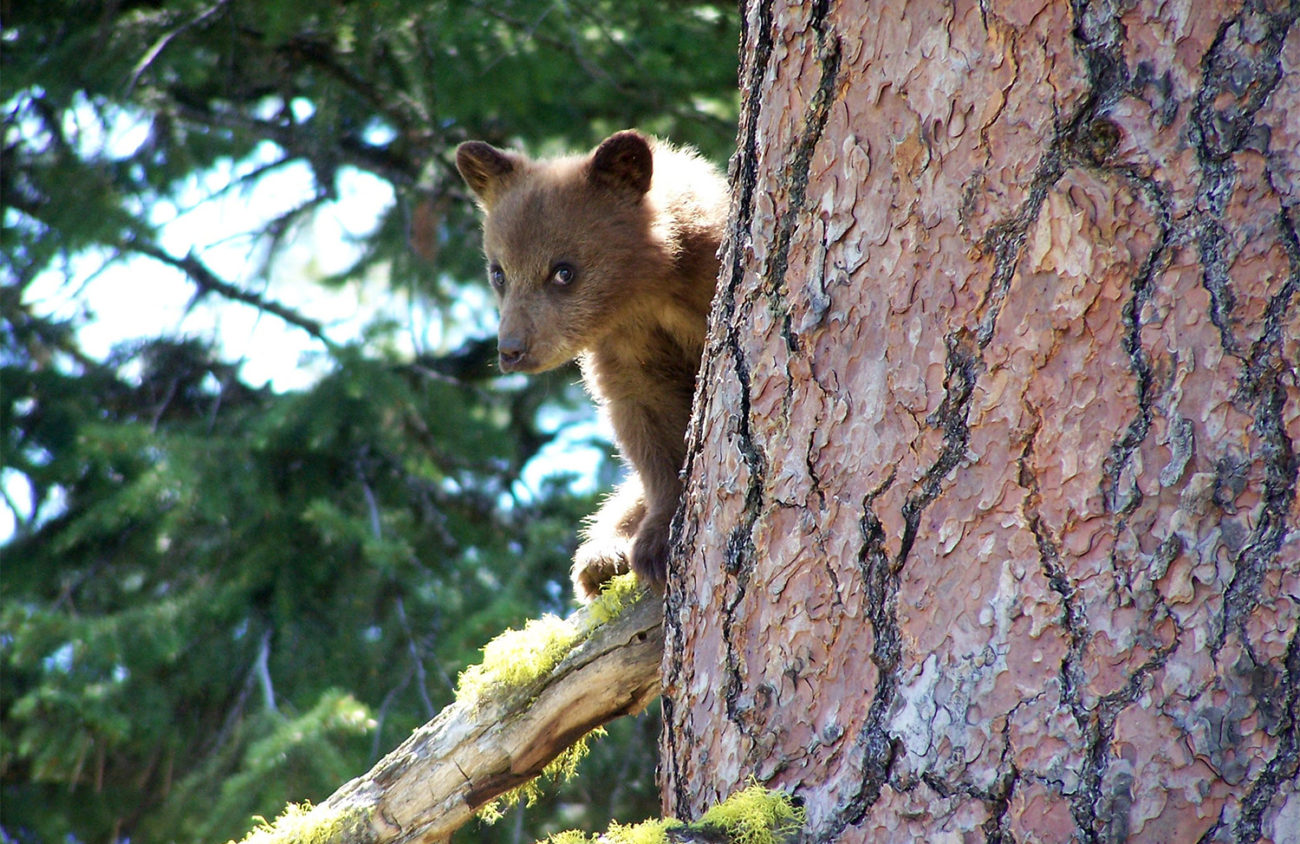In the south hills of Eugene, where the city meets the forest, the late spring and early summer months mean a lot of things. The sun shows its face a little more, the bone-chilling rain becomes a warm, temperate mist, and out of the wildflowers emerge many of our city’s wild residents.
Flipped over trash cans and bear droppings in the backyard are common occurrences, and fearful hikers panic over curious yet vigilant mountain lions peering at them through the ferns. It’s early summer: These things happen.
Black Bears
In May and June, the black bears come out of the woodwork. Food, curiosity, or both, are what brings them away from the forest and into your neighborhood.
While black bears live in the south Willamette Valley year-round, they spend the chilly winter months in torpor — a state of lethargy and inactivity, different from hibernation in that the bears occasionally will wake up and leave their dens for short periods before returning to their deep sleep. In essence, torpor is a less extreme form of hibernation.
“They’re at a low metabolic rate, but they can pop out of it really quickly,” says Christopher Yee, a wildlife biologist with the Oregon Department of Fish and Wildlife.
In the spring months, torpor ends and the bear sightings begin. Making up for months of inactivity, black bears are hungrier than ever this time of year, and the huckleberries they most enjoy have yet to come into abundance.
Due to the rain and inconsistent weather of May and June, the berry crop may be unavailable until July, and the already-ravenous black bears could be forced to wait. According to Yee, wildlife officials have already seen delays in the berry boom in the Coast Range, which is home to high concentrations of bears.
ODFW has identified eight black bears within the Eugene city limits, and they’re following the food.
“They’re like most wild animals, they’re driven by food,” Yee says. “If there’s a food source for them, they’re going to be there and they’re going to be eating it.”
Black bears are desperate right now, and to avoid a run-in, people need to think twice about everyday things like putting out the trash, or setting up a bird feeder on the patio.
Yee says that when bears scavenge in city neighborhoods, they can become habituated to human food and contact, and more likely to cause a threat to public safety. In the event that this happens, the state is forced to remove the bear, lethally.
“None of us working at ODFW want to go around killing bears because they’re hungry, but that can be prevented by people taking some precautionary steps,” Yee says.
Yee says one of the biggest issues happens on garbage day. People set their trash out for pickup the night before. But during bear season, this allows the hungry bears to topple trash cans and steal easy, but unhealthy meals.
“That’s an easy fix,” Yee says. “Keep your garbage locked up in the garage or the shed or something where the bears can’t get to it on non-garbage pick up days, and then take it out to the curb the morning of pickup.”
But the problem isn’t limited to trash. Bird feeders are packed full of nutrient-rich seeds that are irresistible for hungry bears. It’s best to set the bird feeder aside during the late spring and early summer months.
Enlarge

Photo Courtesy ODFW
Mountain Lions
It’s every hiker’s worst fear to see the green-golden eyes of a mountain lion staring at them through thick ferns. But while feared, it is also an inherent possibility in and around Eugene. Oregon is home to over 6,000 cougars, according to the ODFW website.
When cougars get into residential areas around Eugene, Yee boils it down to two types of scenarios.
On one hand, sometimes a desperate cougar will come and attempt to hunt people’s pets. In this event, the agency acts quickly to remove the animal, because according to Yee, hunting household pets is a prelude to hunting humans and creates a public safety issue.
The second scenario is simple. Sometimes, a cougar will simply become lost. In this event, ODFW will often grant the cat a period of time, generally overnight, to slip out of town unscathed.
In Eugene’s outskirts and wild areas, cougars are naturally occurring. It’s not a matter of them being lost, or trying to come after you or your pet; there’s just the chance of crossing paths with one.
In order to prevent an encounter, ODFW says to stay alert, especially at dawn and dusk, hike in groups, keep dogs on leash, refrain from feeding wildlife and store food in animal-proof containers.
“It’s similar to past years, because people are bumping into mountain lions all the time and in most cases, the lions don’t want to have anything to do with people,” Yee says.
Yee assures people not to panic if they see a cougar in the wild, and reminds everyone that their feline behavior is no indication of predation on people.
“They’re like a gigantic feral housecat, and a lot of times they’ll eyeball you or follow you and it’s just cat behavior, it doesn’t mean that they’re stalking you and they’re going to try to eat you,” Yee says.
In the event of a face-to-face sighting, ODFW says not to run, to make noise such as clapping your hands and speaking firmly, to pick up any children without turning your back or bending over, to maintain eye contact with the animal, and to make yourself big by raising your arms. ν
For more information on living with Oregon’s wildlife, go to DFW.state.or.us/wildlife/living_with
